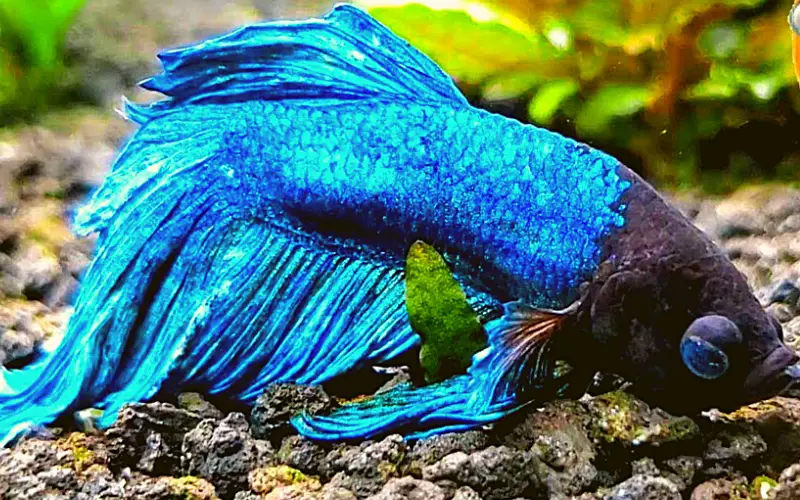What are the symptoms of betta fish sickness? Betta fish, or Siamese fighting fish, are famous pets due to their vibrant colors and unique personalities. However, many betta fish owners may not realize that these beautiful creatures are susceptible to various illnesses that can threaten their health and well-being.
In this Comprehensive betta fish care guide, we will expose seven deadly threats Betta fish can face and provide valuable information on recognizing and treating these sicknesses.
From fungal infections to parasitic diseases, betta fish are vulnerable to various health issues that can be fatal if left untreated.

Understanding the sick betta fish signs and symptoms is crucial for betta fish owners to provide the best care for their beloved pets.
Whether you are a new betta fish owner or have been caring for these fish for years, being aware of these potential threats is essential to ensuring the health and longevity of your betta fish.
Read on to learn about the seven deadly threats every betta fish owner must know to keep their fish happy and healthy.
Table of Contents
ToggleSick Betta Fish Behavior
How do you tell if a betta fish is sick? Sick betta fish often exhibit noticeable changes in behavior. Your Betta fish may become less active and rest more at the bottom of the tank. Some sick bettas may also lose their appetite and eat significantly less than usual.
In addition, their fins may appear clamped or folded, and they may display erratic swimming patterns. Sick bettas may show distress by gasping for air at the water’s surface or rubbing their bodies against objects in the community tank.

Another one of the most common behaviors in sick bettas is an increase in hiding as they seek shelter from the stress of their illness. Observing changes in your betta fish’s behavior can indicate something is wrong, and prompt action may be necessary to address any health issues.
By monitoring their behavior closely and seeking veterinary care if necessary, you can help ensure your betta fish’s healthy and happy life.
7 Common Betta Fish Diseases
Like any other pet, Betta fish are susceptible to various diseases that can impact their health. Seven common Betta fish diseases include:
1. Betta Fish Diseases Dropsy (Pineconing)
Dropsy, or Pineconing, is a common freshwater fish disease caused by fluid buildup within the body. Symptoms include a swollen belly and raised scales, giving the fish a pinecone-like appearance.
Dropsy is often a result of poor water conditions or a bacterial infection. It is essential to quarantine affected fish and treat your Betta with medication to prevent the spread of the disease to other fish in the tank.
2. Betta Swim Bladder Disease (SBD)
Betta fish swim bladder disease (SBD) is a common condition that affects the fish’s ability to swim properly. Several factors, including overfeeding, constipation, bacterial infections, and water quality, can cause it.
SBD Betta fish sick Symptoms include the fish floating uncontrollably, swimming upside down, or sinking to the bottom of the tank. Treatment typically involves adjusting the fish’s diet, improving water conditions, and using medication if necessary.
3. Fin rot betta:(Fin and Tail Rot)
Betta fish are susceptible to Swim Bladder Disease (SBD), which can cause them to have difficulty swimming or floating correctly. This can be due to overfeeding, constipation, or even physical deformities.
Symptoms include swimming upside down, floating at the top or bottom of the tank, or difficulty swimming. Treatment may involve adjusting the fish’s diet, lowering water levels, or using medication as a veterinarian prescribes.
4. Betta Fish Velvet Disease
Betta fish velvet disease, or Oodinium, is a highly contagious parasitic infection that causes the fish’s skin to appear covered in fine, golden dust. A single-celled organism causes it and typically occurs when the fish is stressed or in poor aquarium water.
Treatment includes raising the water temperature to 80-82°F, adding stress coat medication, and using antibiotics. Quarantine and regular water changes are also crucial for prevention.
5. Betta ich Disease
Betta fish ich disease, also known as white spot disease, is a common ailment among bettas. It is caused by a protozoan parasite that attaches to the fish’s skin and gills, causing small white dots and irritation.
Symptoms include flashing, rubbing against objects, and loss of appetite. Treatment involves raising the water temperature and using medication designed to combat parasites like formalin or malachite green.
6. Popeye Betta Fish Sickness
Popeye is a common betta fish disease characterized by bulging one or both eyes. A bacterial infection can cause poor water quality or physical injury. Betta fish sick symptoms include swollen, protruding eyes and behavioral changes.
Treatment involves improving water conditions, using antibiotics, and providing a stress-free environment. Regular water changes and a well-balanced diet can also help prevent Popeye in betta fish.
Remove the infected fish and transfer it to a quarantine tank. Popeye eye disease can be treated effectively by adding one tablespoon of aquarium salt to every five gallons of water. Once you observe improvement, you can return the fish to its original aquarium.
7. Parasites and Bacterial Infection
Parasites and bacterial infections can both cause harm to their hosts. Parasites such as tapeworms and fleas can cause various health issues, from irritation and discomfort to severe illness.
Bacterial infections, on the other hand, can lead to conditions such as strep throat, urinary tract infections, and food poisoning. Both internal parasites and bacterial infections require proper treatment to prevent further health complications.
How to Identify & Treat Betta Fish Sickness?
To identify diseases in betta fish, look out for symptoms such as loss of appetite, unusual swimming patterns, changes in behavior, lethargy, fin or tail rot, bloating, discoloration of the skin, and sagging or bulging eyes.
Once a betta fish illness is identified, proper treatment is crucial. Over-the-counter medications and aquarium salt can be used to treat the fish for common diseases like fin rot or ich (white spot disease).
It is important to quarantine the sick fish in a separate tank during treatment to prevent the spread of disease to other tank mates.
Also, maintaining good water quality and a balanced diet can help prevent illnesses in betta fish. Always consult a veterinarian or experienced fish breeder for proper diagnosis and treatment, as some diseases may require specific medications or treatments.
As a responsible pet owner, it is essential to regularly monitor the health of betta fish and provide them with the proper care and attention they need.
Here are some common sick betta fish signs to watch for:
Behavioral changes:
- Lethargy: A usually active betta becomes sluggish and hides more often.
- Loss of appetite: They may refuse food or show little interest in eating.
- Difficulty swimming: They may struggle to stay upright or swim erratically.
- Gasp for air at the water surface: This could indicate gill problems or insufficient oxygen in the water.
- Clamping fins: They hold their fins close to their body instead of displaying them fully.
Physical changes:
- Fin rot: The fins appear ragged, discolored, or have bloody edges.
- White spots: Tiny white spots on the body or fins, a sign of ich (parasitic infection).
- Cloudy eyes: Loss of eye clarity or bulging eyes.
- Body sores or ulcers: Open wounds or lesions on the skin.
- Bloating or pineconing: Scales raised at an angle, making the fish appear like a pinecone.
Once you’ve identified potential signs of illness, acting quickly to improve your Betta’s environment and treat the underlying cause is essential. Here are some general steps:
- Isolate the sick Betta: Remove them from their main tank to a hospital tank to prevent infecting other fish.
- Test the water quality: Ensure proper water parameters (pH, ammonia, nitrite, nitrate) are within the acceptable range for bettas.
- Perform a partial water change: Remove 25-50% of the water and replace it with fresh, conditioned water.
- Treat the specific illness: Use appropriate medications or remedies depending on the suspected cause. Aquarium shops and online retailers offer various treatments for common betta fish ailments.
Remember, early diagnosis and intervention are crucial for your Betta’s recovery. If you need more clarification about the cause of your fish’s illness or the treatment options, consult a qualified veterinarian or fish specialist for professional advice.
What should you do if your Betta is sick?
If your betta fish shows signs of illness, taking action as soon as possible is essential. The first step is to carefully observe your fish and note any changes in behavior or appearance. Common signs of illness in bettas include lethargy, loss of appetite, fin rot, bloating, and unusual swimming patterns.
Once you have identified that your Betta is sick, you should immediately isolate it from any other fish to prevent the spread of the disease. Research the symptoms your Betta is exhibiting and seek advice from a knowledgeable source, such as a veterinarian or experienced fish keeper.
Maintaining a clean and well-filtered tank environment for your Betta is important, as poor water quality can exacerbate illnesses. Depending on the specific disease, you may need to administer medication or adjust the water parameters to help your Betta recover.
Monitor your Betta closely and provide the necessary care and attention until it fully recovers. Many betta illnesses can be successfully treated with prompt action and proper care.
How to Prevent Betta Diseases Before They Start?
Preventing betta diseases before they start requires a proactive approach to maintaining the health of your fish.
Start by ensuring your Betta has a clean and appropriately sized tank, as poor water conditions can lead to stress and weaken their immune system. Regular water changes and proper filtration are essential in keeping the tank environment healthy.
A balanced diet is also crucial, so feed your Betta various high-quality live foods to ensure they receive all the necessary nutrients. It’s also essential to avoid overfeeding, as uneaten food can lead to water contamination and stress.
In addition, monitoring the water temperature and maintaining it within the recommended range will help prevent temperature-related illnesses. Lastly, quarantining new fish before introducing them to the main tank can prevent the spread of diseases.
By taking these preventative measures, you can help keep your betta fish healthy and disease-free.
Commonly Asked Questions about betta illness and treatment (FAQs)
What are the symptoms of a sick betta fish?
A suffering aquarium fish like a betta may show lethargy, clamped fins, loss of color, or difficulty swimming. Check for bulging eyes, white growths, or fin rot. Act fast – isolate the fish and adjust water quality.
How do you help a sick betta fish?
It needs immediate action if your fish is suffering! Stop feeding your fish, isolate it in clean water, and adjust tank temperature. If there is no improvement, consult a fish store or vet for diagnosis and medication. Avoid treating blind!
How do you know if your betta fish has a parasite?
It could be parasites if your Betta shows unusual behavior like flashing (scraping against objects), clamped fins, weight loss, or white/black growths. Watch for darting movements or difficulty breathing. Isolate the fish to avoid infecting others and seek advice from a vet or experienced fish store to diagnose and treat safely.
What is the main cause of death of betta fish?
The leading cause of death for betta fish is often attributed to poor water conditions, including inadequate filtration, temperature extremes, high levels of ammonia or nitrite, and irregular aquarium water changes.
Is my Betta fish suffering?
Determining if a betta fish is suffering requires careful observation. Look for sick betta fish signs such as lethargy, loss of appetite, clamped fins, unusual color changes, or visible physical abnormalities. If you suspect your betta fish is suffering, it’s best to consult a veterinarian with expertise in aquatic animals.
How do I know if my Betta is stressed?
Stressed betta fish may exhibit various signs such as decreased appetite, fin clamping, excessive hiding, unusual color changes, increased aggression, or rapid breathing. It’s essential to closely monitor their behavior and environment to identify and promptly address any stressors.
Conclusion
In conclusion, caring for betta fish requires knowledge, dedication, and a watchful eye. Providing them with a clean and suitable environment, a balanced diet, and regular monitoring can help prevent common health issues. However, despite our best efforts, betta fish diseases can still occur. If you notice any signs of illness in your Betta, such as changes in behavior, appetite, or physical appearance, it’s crucial to act promptly. Consult a veterinarian or a knowledgeable fish expert to diagnose and treat any potential betta fish sickness. Remember, a thriving and healthy betta fish brings joy and beauty to your home aquarium.
You might also like
- Pineconing Betta Fish Diseases (5 Symptoms & Best Treatment)
- My Betta Fish Won’t Eat and Barely Moves: Solved & Explained
- Are Female Bettas Aggressive: (Fun Facts & Helpful Tips)
- What Does Betta Fish Poop Look Like? (A Surprising Answer)
- Betta Losing Color and Laying on Bottom of Tank: (Solved)
- Betta Fish Fin Loss 101: Causes, Care, and Prevention Tips
- Bloating Betta Fish 101: Common Causes & Effective Treatment





